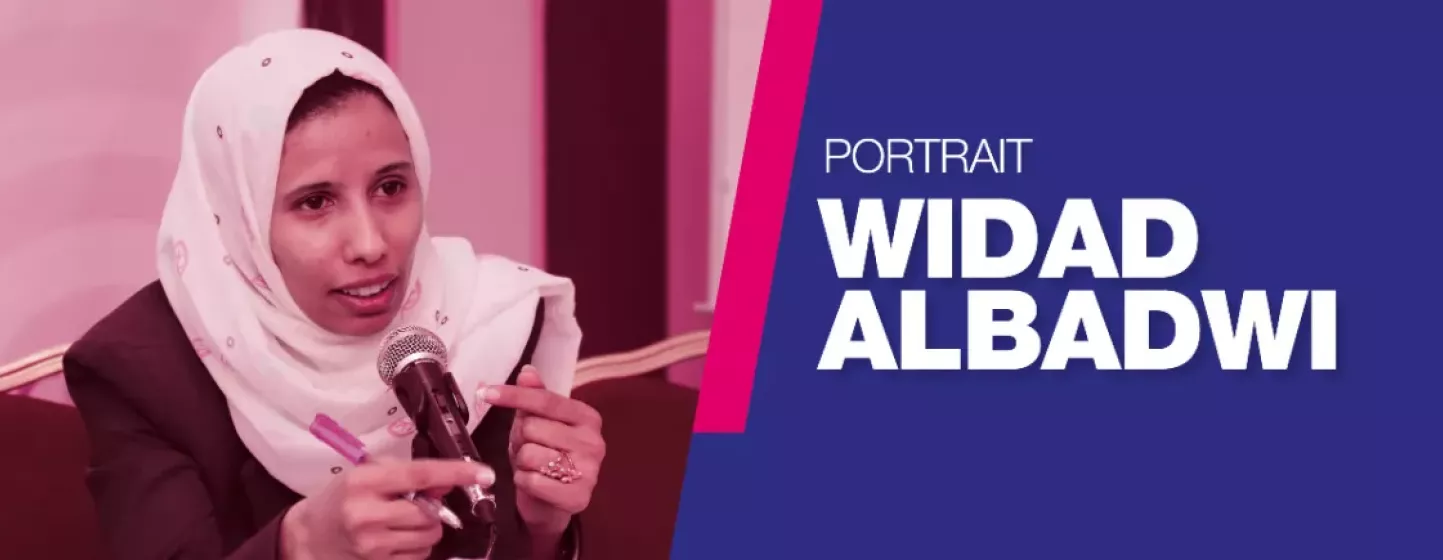Wedad Albadwi, founder of the Cultural Media Centre in Sana’a
Education and culture lie at the very heart of a developed society. Journalist Wedad Albadwi has grasped this, which is why she set up CMC, the Cultural Media Centre in Sana'a, the capital of Yemen, in the aftermath of the Arab Spring.
Profile by Lou Mamalet.
Wedad Albadwi was born in Taiz, a city on the high plateaux in the south-west of Yemen. Against her parents’ advice, she left her home town to go and study journalism in Sana'a. It was a decision they would come to accept over time, as they observed that she would not be resigned to changing her mind.
Committed to the cause of women in Yemen
In Wedad’s view, journalism is first and foremost a means of speaking up for those who don’t have a voice, “I saw journalism as a platform not only for making my own voice heard but especially the voices of others. I wanted to have the power to influence decision-makers by telling the stories I heard around me and making known the social problems of the women around me who shared their suffering with me”, she explains.
Very early on in her career, she began specialising in human rights issues and subjects related to the position of women. In particular, she works as an investigator on the ground for local NGOs committed to women’s rights. It is a necessary task in Yemen, the worst-ranked country for the last 13 years on the World Economic Forum’s Global Gender Gap Index (according to a report by Amnesty International). Women there are the victims of inequality that is deeply rooted, owing to the patriarchal nature of Yemeni society. The situation has been aggravated by the economic crisis caused by the civil war, which has made Yemeni women even more vulnerable to every kind of violence.
Wedad decided to found a cultural centre with some friends in order to take her vision further. And so the CMC (Cultural Media Centre) came into being in 2011, amid the Arab Spring protests. “We wanted to create a cultural platform that could change people’s attitudes towards various issues in Yemen but also improve the standard of education in the country", says the journalist.
Founder of a centre for culture and the media
Together, the members of the group began organising cultural events, such as plays but also introducing training for young journalists. The new organisation regarded this set of initiatives as a means of supporting local development: “We really wanted to address matters of social injustice and human rights through simple actions that could have an impact on many people”, she explains. In just a few years, the CMC has managed to build a network of female journalists throughout the country, as well as a cultural observatory for keeping information on all activities within the country up to date.
In parallel with this, Wedad is actively involved in the development of humanitarian journalism. In particular, she has taken part in training sessions offered by CFI, as part of the YMER+ project. Wedad is also involved in the Makanati project (meaning "my place" in Arabic), which aims to boost women’s participation in Iraqi and Yemeni society and create a better understanding of their concerns among the general population.
Striving for peace and equality
Funded by national and international organisations such as Internews and the Yemeni Ministry of Culture, the CMC now has seven permanent employees, two part-time employees and a number of volunteers. A team completely dedicated to defending human rights, despite a difficult political situation.
“Since the start of the war, the whole country has been divided between two governments in the north and south, making the situation very complicated, as aid workers and journalists working for either camp are often threatened or killed. Our role is to help them, regardless of their political opinions or activities”, declares the journalist.
That’s a tough task in Yemen, where freedom of expression is under heavy attack. Since 2015, around fifteen journalists have been taken hostage by armed groups, such as Houthi rebels and Al-Qaeda, and the working conditions for journalists are such that many have opted to give up their profession and retrain (according to a report by Reporter sans frontières. But Wedad is not giving up and fully intends to overcome the obstacles ahead of her, as she organises training for young women who want to become journalists.
“When you’re a woman, there are many obstacles to overcome in order to live in Yemen. You’re not free to wear what you want or move around as you like. Today, in Sana'a, being in a public place with men is complicated, that’s why it's important not to give up on education for young women and future journalists”, she states.
It's a battle she continues to fight as she waits for peace and stability in her country. Her only hope for the future is that: “In times of war, personal and political become increasingly interconnected. Without peace, it’s impossible to look to the future and dream, either from a personal or professional perspective”.
